Last Updated on March 18, 2024
We reported Facebook phishing attacks back in 2020, but scammers keep upgrading their tactics and tricks to steal your personal data and access to your account. Several Facebook fan pages and public groups called “Appeal a Page Policy Violation” appeared recently and are trying to attack Facebook users. Check how the scam works and how to protect yourself from it:
“Your page has been scheduled for deletion”
1. Hackers send fan page owners this message, claiming that the page “has been scheduled for deletion” for violating the Community Standards rules. Then they ask users to click on a link immediately to “cancel the deletion,” or the page will be deleted.
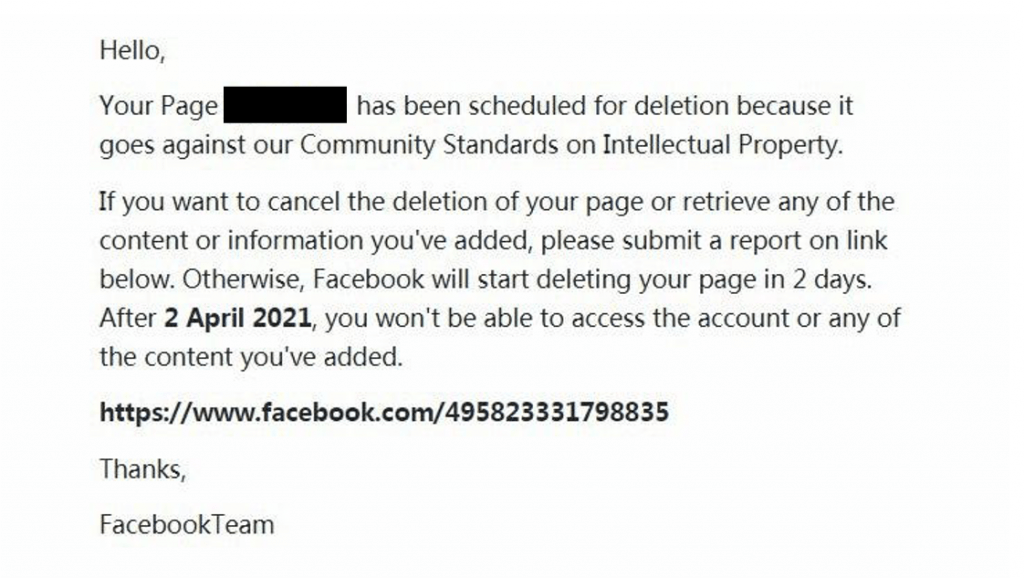
Sample Facebook Page Deletion Message
- Hello, Your Page has been scheduled for deletion because it goes against our Community Standards on Intellectual Property. If you want to cancel the deletion of your page or retrieve any of the content or information you’ve added, please submit a report on link below. Otherwise, Facebook will start deleting your page in 2 days. After 2 April 2021, you won’t be able to access the account or any of the content you’ve added. HTTP[]s://www.facebook.com/495823331798835 Thanks, FacebookTeam
- dear admin, your fanpage was reported by someone that some of your posts violate our community standards on intellectual property rights.we confirm that this fanpage is in violation and have scheduled it to be deleted from facebook within 24 hours.for more information on this issue or if you think this is a mistake. please read the community standards and contact us to confirm that your fanpage does not violate: https:// meta – 11 – 2024[.]com .thank you for reading this message. sincerely, meta support team.
2. The link leads to a Facebook note page entitled “Appeal a Page Policy Violation.” On this page, some details of the “case” are shown, and this note prompts users to file complaints through another link. The link seems legitimate and leads to a web page that looks like a real Facebook page. (It’s, indeed, a fake one!)
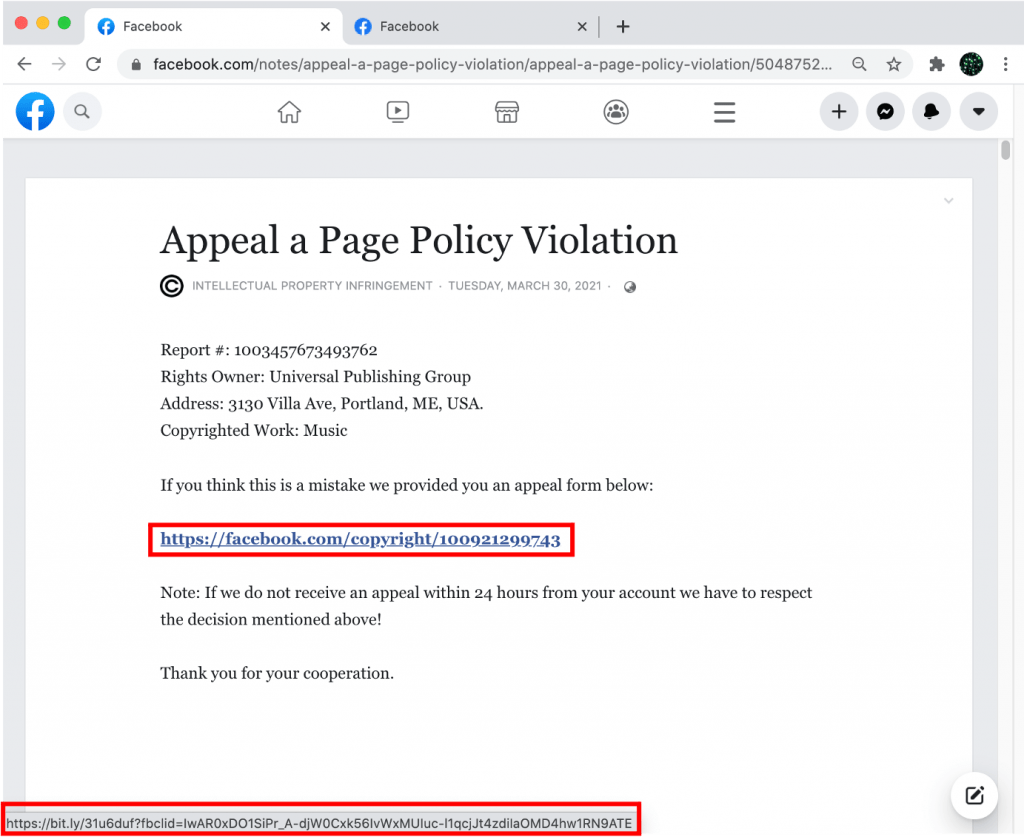
Appeal a Page Policy Violation (g) INTELLECTUAL PROPERTY INFRINGEMENT ■ WEDNESDAY, MARCH 17, 2021 • $ Report #: 1003457673493762 Rights Owner: Universal Publishing Group Address: 3130 Villa Ave, Portland, ME, USA. Copyrighted Work: Music If you think this is a mistake we provided you an appeal form below: HTTP[s]: //facebook.com/copyright/100921299743 Note: If we do not receive an appeal within 24 hours from your account we have to respect the decision mentioned above! Thank you for your cooperation.
3. We found that hackers use an external link (bit.ly) to redirect you to the fake Facebook helpdesk page as shown below. You will find that all the buttons and links on this page don’t work except for the “Appeal” button.
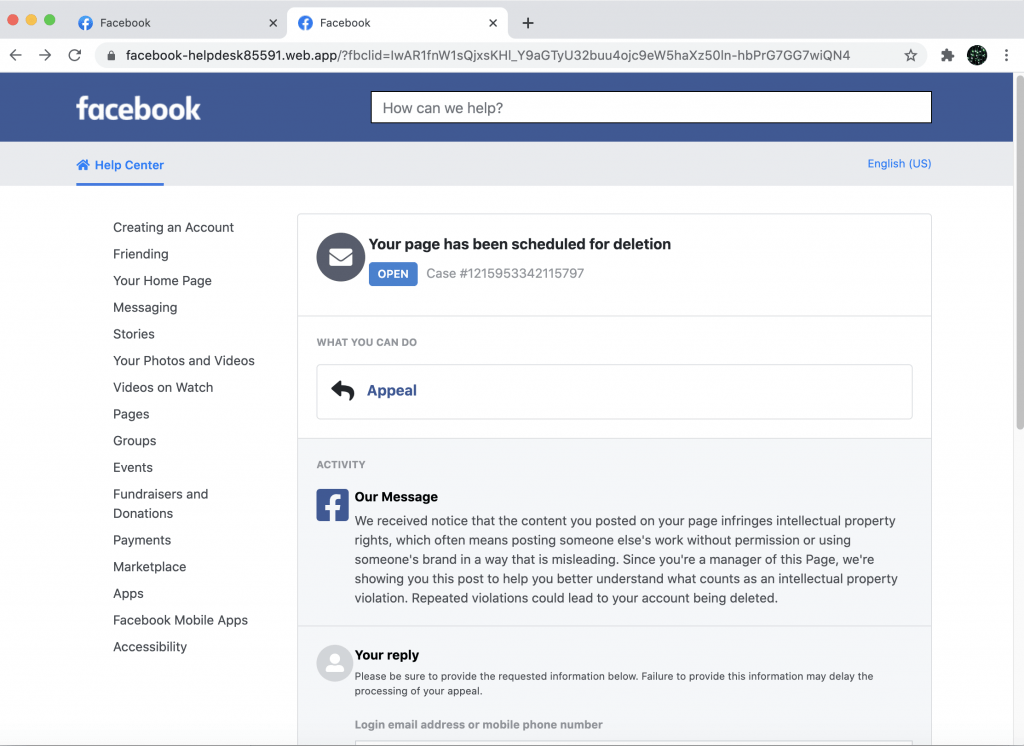
4. If you click on the “Appeal” button, a form will unfold and ask you to fill in information like login email addresses, phone numbers, names, and page names. The information you submit will end up in scammers/hackers’ hands. With that, they can contact you, pretending to be Facebook officials, and trick you into sending your login credentials. They can thus get access to your Facebook account along with your fan pages. Or, they can use the information for other scams such as identity theft.
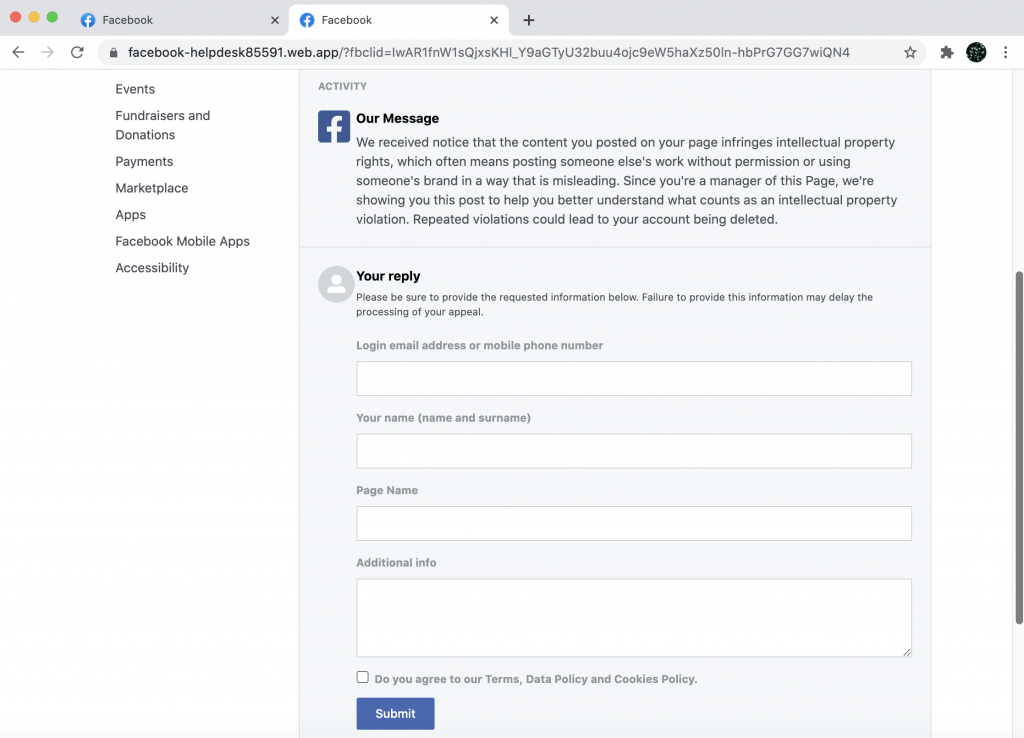
Sample Facebook Page Deletion Message with a Linkpop URL
Recently, we found that scammers are also utilizing linkpop.com to host such Facebook/Meta page deletion scams:
- important notification: your facebook page is scheduled for permanent deletion due to a post that has infringed upon our trademark rights. we have reached this decision after a thorough review and in accordance with our intellectual property protection policies. if you believe this to be a misunderstanding, we kindly request you to file a complaint seeking the reinstatement of your page prior to its removal from facebook. request for review: https://linkpop[.]com/protectcopyrightsid-www-com we understand that this situation may impact your ongoing business operations. however, please be informed that if we do not receive a complaint from you, our decision will be final. your cooperation and understanding are greatly appreciated. should you have any inquiries or apprehensions, please feel free to reach out to us. sincerely, facebook support team © noreply facebook. meta platforms, inc., attention: community support, 1 facebook way, menlo park, ca 94025

While linkpop.com itself is a legitimate platform, scammers make it their tool to spread phishing links that, again, will take you to a copycat Meta support page where you could end up exposing all your credentials. Be careful!
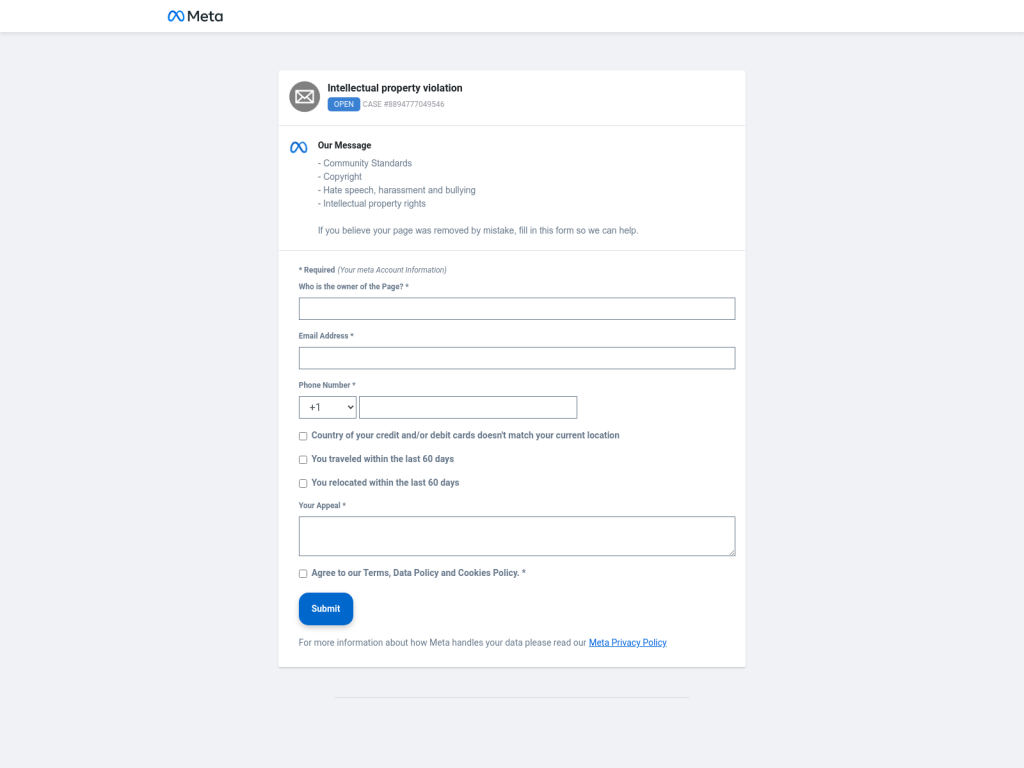
How to avoid “Your page has been scheduled for deletion” scams
- Pay attention to the web address. A legitimate Facebook official page should always start with facebook.com/.
- Turn to the Facebook official directly for help. Don’t use links others provide you; search for Facebook Help Center and go to the site yourself instead.
- Be smart with your personal information. Please don’t share it online!
- Never click on links from unknown resources. Check before you take any action!
The truth is, there are lots of scams and scam sites on the internet and they’re getting even more difficult to detect with common sense alone. However, for an easy and reliable method of detecting and avoiding scam sites, check out our free Trend Micro ID Protection!
ID Protection can shield you from scams, fake and malware-infected websites, dangerous emails, phishing links, and lots more! If you come across something dangerous online, you’ll be alerted in real time so you’ll know to stay well clear.
If you found this article helpful, please SHARE to protect your family and friends!
14 Comments
- By Jan | December 8, 2023
- By John Paul Icaranom, Celestino | December 8, 2023
- By Tash | October 24, 2023
- By Chathurika | October 24, 2023
- By Teri V | October 21, 2023
- By Giovanni Lanteri | October 20, 2023
- By Walter Nieto | October 14, 2023
- By Michael Foley | May 9, 2023
- By Aurelie Laurinavicius | April 3, 2023
- By Pougne | March 17, 2023
- By Lois | February 20, 2023
- By James Bailey | January 13, 2023
- By Qubile Cele | January 8, 2023
- By Phil Thomas | October 20, 2022
